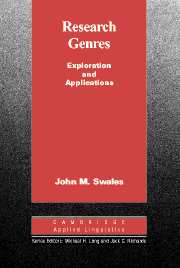Book contents
- Frontmatter
- Contents
- Series editors' preface
- Acknowledgments
- Chapter 1 Toward a world of genre
- Chapter 2 The role of English in the research world
- Chapter 3 Theoretical and methodological issues
- Chapter 4 “Getting done”: The Ph.D. dissertation
- Chapter 5 The Ph.D. defense
- Chapter 6 Research talk and research talks
- Chapter 7 The research article revisited
- Chapter 8 Three remaining issues
- Appendix
- Notes
- References
- Author index
- Subject index
Chapter 7 - The research article revisited
Published online by Cambridge University Press: 05 October 2012
- Frontmatter
- Contents
- Series editors' preface
- Acknowledgments
- Chapter 1 Toward a world of genre
- Chapter 2 The role of English in the research world
- Chapter 3 Theoretical and methodological issues
- Chapter 4 “Getting done”: The Ph.D. dissertation
- Chapter 5 The Ph.D. defense
- Chapter 6 Research talk and research talks
- Chapter 7 The research article revisited
- Chapter 8 Three remaining issues
- Appendix
- Notes
- References
- Author index
- Subject index
Summary
The longest chapter in Genre Analysis was devoted to the research article (RA), covering its history, the styles and structures across its main sections, and its variability across disciplines and across languages. I do not intend here to provide a comprehensive update on this research genre as we understand it some fifteen years later. One reason for this is that the huge amount of work on this “master narrative of our time” (Montgomery, 1996) since the late 1980s cannot easily or satisfactorily be condensed into the space available. Another is that the earlier depiction continues to have some general validity. Although the 1990 account has been superceded by later work in some important respects, it still retains a fair amount of robustness in its general outlines and main findings. Overall, what the more recent investigations have shown is that the story told in the Genre Analysis chapter was, perhaps predictably, overgeneralized and now needs to be replaced by a more nuanced account.
One clear sign of this underspeciation (see Chapter 3) lies in the concept of research article itself. In a reprise of their influential 1981 article, Tarone et al. (1998) make the obvious but underrecognized point that not all research articles are experimental (or even empirical). In their own research site of astrophysics, they note that experimentation is actually impossible: “One cannot experiment on a star or a galaxy in the way in which one can experiment on a chemical compound or a bean plant” (1998: 115).
- Type
- Chapter
- Information
- Research GenresExplorations and Applications, pp. 207 - 240Publisher: Cambridge University PressPrint publication year: 2004
- 2
- Cited by



